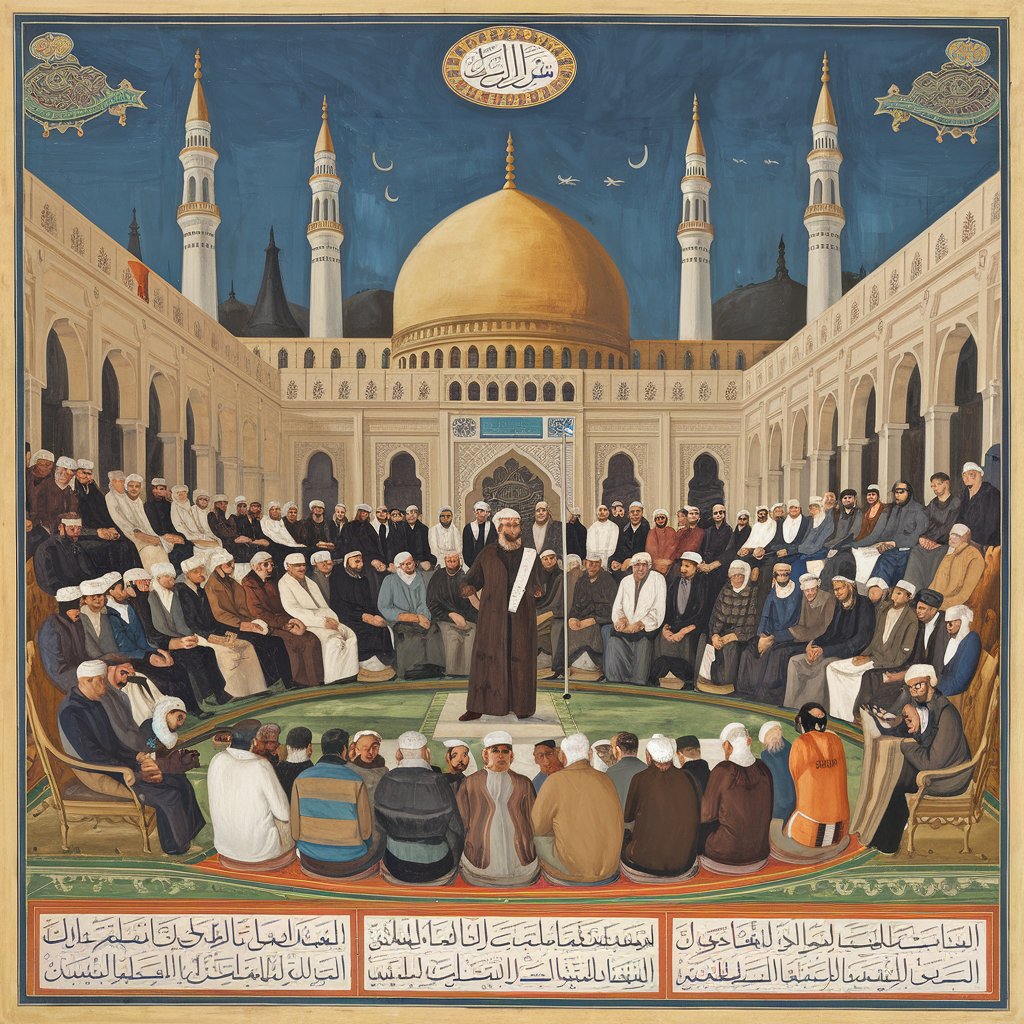Early Life
One of the most important leaders in Islamic law, Imam Malik ibn Anas, imam malik born in hijri Madinah in the year 93 AH (711 CE). The Prophet Muhammad’s (PBUH) city of Madinah served as a major center for Islamic scholarship and learning, and Malik grew up in this lively intellectual environment.
Malik ibn Anas ibn Malik ibn Abi ‘Amir al-Asbahi was his complete name. He was a member of the Banu Asbah tribe, which was a clan within the larger Arab tribe of Himyar in Yemen.
Education and Influences

Malik was steeped in the study of the Quran and Hadith from an early age. The scholars of Madinah, who were the close associates of the Prophet Muhammad (PBUH), influenced his early education.
Malik’s intellectual and spiritual growth was significantly impacted by his near closeness to the origin of Islamic beliefs. He was well-known for having a good memory and an understanding of religious studies, and he had memorized the Quran at an early age.
Renowned jurist of the era Rabia ibn Abi Abdul Rahman, also known as Rabia al-Rai, was one of Malik’s most important professors. Malik gained a thorough understanding of jurisprudence and the tenets of Islamic law via his study with Rabia.
In addition, he learned from and assimilated the customs and legal views passed down from Ibn Umar through studying under Nafi’ Mawla Ibn ‘Umar, the liberated slave of the companion Abdullah ibn Umar.
Formation of the Maliki School

One of the four main Sunni Islamic schools of jurisprudence, the Maliki school of thought, was founded as a result of Imam Malik’s expertise. The Maliki school of thought is distinguished by its reliance on the customs of the Madinah community (Amal Ahl al-Madinah) as the ultimate source of law.
Malik thought that the customs and practices of the Madinahites, who were descended from and adhered to by the Prophet’s companions, had great authority and accurately reflected the Prophetic legacy.
The Maliki school of thought emphasizes the Quran and Hadith as the main sources of law, but it also uses the juristic discretion (istihsan) and the consensus (ijma) of the Madinah scholars to reach its legal conclusions. Within the confines of Islamic law, this practical approach permits flexibility and adaptability in handling new and emerging situations.
Al-Muwatta: The Benchmark of Hadith Literature

Imam Malik’s “Al-Muwatta,” or compilation of Hadith, is one of his most enduring contributions to Islamic learning. This compilation of hadith is regarded as one of the oldest and most reliable. The term “Al-Muwatta” translates to “The Approved” or “The Well-Trodden Path,” signifying its standing as a thoroughly examined and well-respected collection.
In “Al-Muwatta,” Malik painstakingly picked Hadiths that the Madinahites largely agreed upon and followed. In addition to Hadiths, Malik’s legal judgments and interpretations are included in the book, offering a thorough overview of Islamic jurisprudence. It bridges the gap between practical legal rulings and prophetic traditions by acting as a collection of hadiths and a textbook of law.
“Al-Muwatta” became well-known and enjoyed great respect from academics throughout the Muslim world. It received recognition for both the authenticity of its content and its methodological rigor. “Al-Muwatta” was considered as one of the most trustworthy Hadith sources by numerous scholars in the later era, including Imam Shafi’i, who regularly cited it in his writings.
Political Stance and Persecution

Within the Islamic empire, Imam Malik lived amid a period of political unrest and instability. The Abbasid revolution was under way, and the Umayyad dynasty was in decline. Malik remained apolitical, always acting with caution and morality. He thought that academics ought to maintain their independence and resist being appropriated by the government.
But this position brought about conflict with the ruling class. Malik was persecuted because he publicly opposed certain governmental practices and refused to acknowledge the authority of the Abbasid caliphate. The Abbasid governor of Madinah ordered his imprisonment and flogging. Malik persisted in teaching and passing on information to his students in spite of this severe punishment, staying true to his beliefs.
Legacy and Influence
The impact of Imam Malik on Islamic scholarship and jurisprudence is significant and long-lasting. One of the most well-known and reputable schools of Islamic law, especially in North and West Africa, as well as in some regions of Egypt, Sudan, and the Arabian Peninsula, is the Maliki school of thought.
His method of approaching jurisprudence, which strikes a balance between the lived customs of the early Muslim community and written sources, had a long-lasting influence on the growth of Islamic legal theory.
Malik’s pupils were essential in spreading his teachings and growing the Maliki school’s influence.
Among his most prominent pupils were Yahya ibn Yahya al-Laythi, whose interpretation of “Al-Muwatta” came to be one of the most well recognized, and Imam Shafi’i, who went on to form the Shafi’i school of thought.
at the year 179 AH (795 CE), Imam Malik departed from this world at Madinah, where he was born and raised. He was interred with some of the Prophet Muhammad’s (PBUH) companions in the renowned Jannat al-Baqi cemetery. Scholars and students of Islamic law continue to honor his legacy, and his contributions to the transmission and preservation of Islamic knowledge are priceless.
Conclusion
One of the most influential people in Islamic jurisprudence history is Imam Malik ibn Anas. His commitment to the study and dissemination of Hadith, his moral leadership in political matters, and his establishment of the Maliki school of thought have all had a profound impact on the intellectual heritage of Islam.
Malik’s influence spans decades and continues to direct Muslims in their comprehension and application of Islamic law through his foundational book, “Al-Muwatta,” and the endeavors of his pupils. His life and contributions to religion serve as an example of the significant influence one scholar may have on the advancement and preservation of religious knowledge.


























































